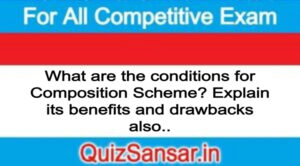
What are the conditions for Composition Scheme? Explain its benefits and drawbacks also..
What are the conditions for Composition Scheme? Explain its benefits and drawbacks also..
Ans.
Conditions for Composition Scheme
Some of the major conditions for Composition Scheme are as follows:
(1) Restricted from making the supply of goods which are not liable to GST: Certain goods are not liable to GST, e.g. petroleum, alcohol for human consumption, etc.-a person opting for composition scheme shall not be entitled to make any supply of non-GST goods.
(2) Restricted from effecting inter-State outward supplies: The taxable person should not affect any inter-State outward supplies. This means that even stock transfers to branches outside the State would not be permitted. However, insofar as it relates to inter-State inward procurements/receipts, there is no restriction.
(3) Restricted from making supplies through an e-commerce operator: A person opting for composition scheme is not allowed to affect any supply of goods through an e-commerce portal, unless such portal is owned by the same person.
(4) Restriction on the manufacture of notified goods: The person opting for the scheme should not be a manufacture of certain goods as are notified in this regard. However, there is no restriction in case a person is engaged in trading of such goods.
(5) Would be applicable for all transactions under the same PAN: Composition scheme would become applicable for all the business verticals having separate registrations within the State and all other registration outside the State which are held by the person with same PAN.
(6) Not entitled to input tax credit : Taxable person opting to pay tax under the composition scheme will not be eligible to claim any input tax credits.
(7) Shall not collect tax: Under the GST composition scheme, traders and manufacturers are not permitted to charge GST from the purchaser and also such dealers have to mandatorily mention in the invoice generated by them that they are composition dealers, and hence, are not required to charge GST.
Benefits of Composition Scheme
(1) Limited Compliance: Under the composition scheme, the taxpayer is required to furnish one yearly return only yet, tax to be deposited quarterly and thus he need not worry on record keeping and can focus on his business more rather than being occupied in compliance procedures.
(2) Limited Tax Liability: Another benefit of getting registered under the composition scheme is that the tax rate for such taxpayer is nominal under the GST Law.
(3) High Liquidity: One of the major benefits of registering as a composition supplier is high fund availability in the business. A normal taxpayer will be required to pay output tax on his supplies at a standard rate. Thus, a large chunk of his working capital will always remain blocked in the form of input credit.
(4) Level Playing Field: Just because a taxpayer has chosen to get registered under the composition scheme, it doesn’t necessarily mean he is losing the competitive edge. Since the profit margin of a supplier in composition scheme is more than a large taxpayer, such supplier can outplay the economies of scale of large enterprises.
Drawbacks of Composition Scheme
(1) Limited Territory for Business: A taxpayer registered under the composition scheme is barred from carrying out inter-State transactions and cannot offer import-export of goods and services.
(2) No Credit of Input Tax: There has been no provision of input credit on B2B transactions. Thus, if any taxable person is carrying out business on B2B model, such person will not be allowed the credit of input tax paid from the output liability.
(3) No Collection of Tax: Though the rate of composition tax is kept very nominal at 0.5%, 1% or 2.5%, of CGST and SGST each, a taxpayer under composition scheme is not allowed to recover such tax from his buyer, as he is not allowed to raise a tax invoice.
(4) Electronic Commerce Operator (ECO) out of scope: Since ECO are into inter-State supplies they are not eligible for composition scheme and thus the benefit has been kept away from them. This is further in contradiction with the government vision of “Digital India” and “Startup India”,
Conclusion
Thus, composition scheme ensures the interest of small suppliers carrying out intra-State transactions and provides with a sustainable and competitive supply market.






